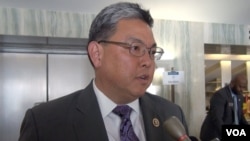Americans celebrate Asian-Pacific Heritage Month in May. This year, the White House sponsored an unprecedented event that has drawn thousands to the nation’s capital.
Nearly 2,000 government officials and community leaders from around the country gathered Tuesday at George Washington University for the first White House summit on Asian-Americans and Pacific Islanders.
Jake Fitisemanu, one of the newly appointed commissioners on President Barack Obama’s Advisory Commission on Asian-Americans and Pacific Islanders, told VOA that the summit is “a chance for everyone to get together and to meet and to see how we can pull resources and really provide a collective effort and unified front to the issues we all face together.”
The U.S. Department of Labor defines Asian-Pacific islanders as people with origins in any of the original peoples of the Far East, Southeast Asia, the Indian subcontinent or the Pacific Islands.
Fitisemanu, wearing Samoan traditional attire for the occasion, claimed, “I’m Asian and Pacific in one package.” His father came from Samoa, and his mother is half Korean and half Chinese; he was born in New Zealand and grew up in Hawaii and Utah.
The population of Asian-Americans and Pacific islanders is growing faster than any other ethnic group in the U.S. By 2060, it’s projected to double and reach 47 million.
Larger political role
As the population grows, Asian-Americans and Pacific islanders are playing a bigger role in the political process.
U.S. Representative Judy Chu, a California Democrat, cited the Senate race in Virginia last year as an example, when Democratic Senator Mark Warner was struggling in the race. She said, “Senator Warner made a very concerted appeal to them that paid off. An overwhelming 68 percent of API supported him. Senator Warner won by less than 1 percent. APIs were clearly the margin of victory.”
More Asian-Americans are running for office, too. In last year’s midterm elections, more Asian-Americans than ever were elected to Congress, including Representative Mark Takai, a Democrat from Hawaii.
He told VOA that Asian-Americans need to have their voices heard while “standing up and speaking out and being part of different communities,” and “that’s really the message.”
Chu said Asian-Americans have been serving in the Cabinet, in the Congress and as business leaders. “Wouldn’t it be great to finally have an Asian-American on the U.S. Supreme Court?” she asked.
The summit also addressed issues such as cultural barriers and stereotypes facing the Asian-American community. One of the biggest stereotypes is Asians as a “model minority.”
Takai said he is proud of the hardworking spirit of Asian-Americans. “It’s true to some extent, especially in Hawaii. Many people in the API community, my parents’ generation, my grandparents’ generation, who came to America with a dream of succeeding — they all have to work hard,” he said. “I’m proud of my Asian-American heritage, and I think part of that is built on hard work.”
Blogger dislikes labels
But Phil Yu, founder of the Angry Asian Man blog, said he doesn’t like labels. “It’s destructive to characterize Asian-Americans as one kind of thing," he said. "There are Asian-Americans who are successful; there are people in our community who suffer from economic, educational and health disparity. I think while the ‘model minority’ is a myth, it needs to be destroyed.”
Yu said his blog helps break down some of the cultural barriers. “I think Asian-Americans in general are seen as very passive, and not very vocal when it comes to issues in the U.S.," he said. "In fact, we have a lot of reasons to stand up and say something. This goes for all Asian-Americans, so I write about issues I think are important, and I want people to know about it.”
Takai added that Asian-Americans should do a better job communicating with other communities. “It’s time for us to come out of our shell, getting more outspoken, not being as laid back as in the past, and we will come together as a community and do much better,” he said.
May was designated as Asian-Pacific American Heritage month in the U.S. by law in 1992.




